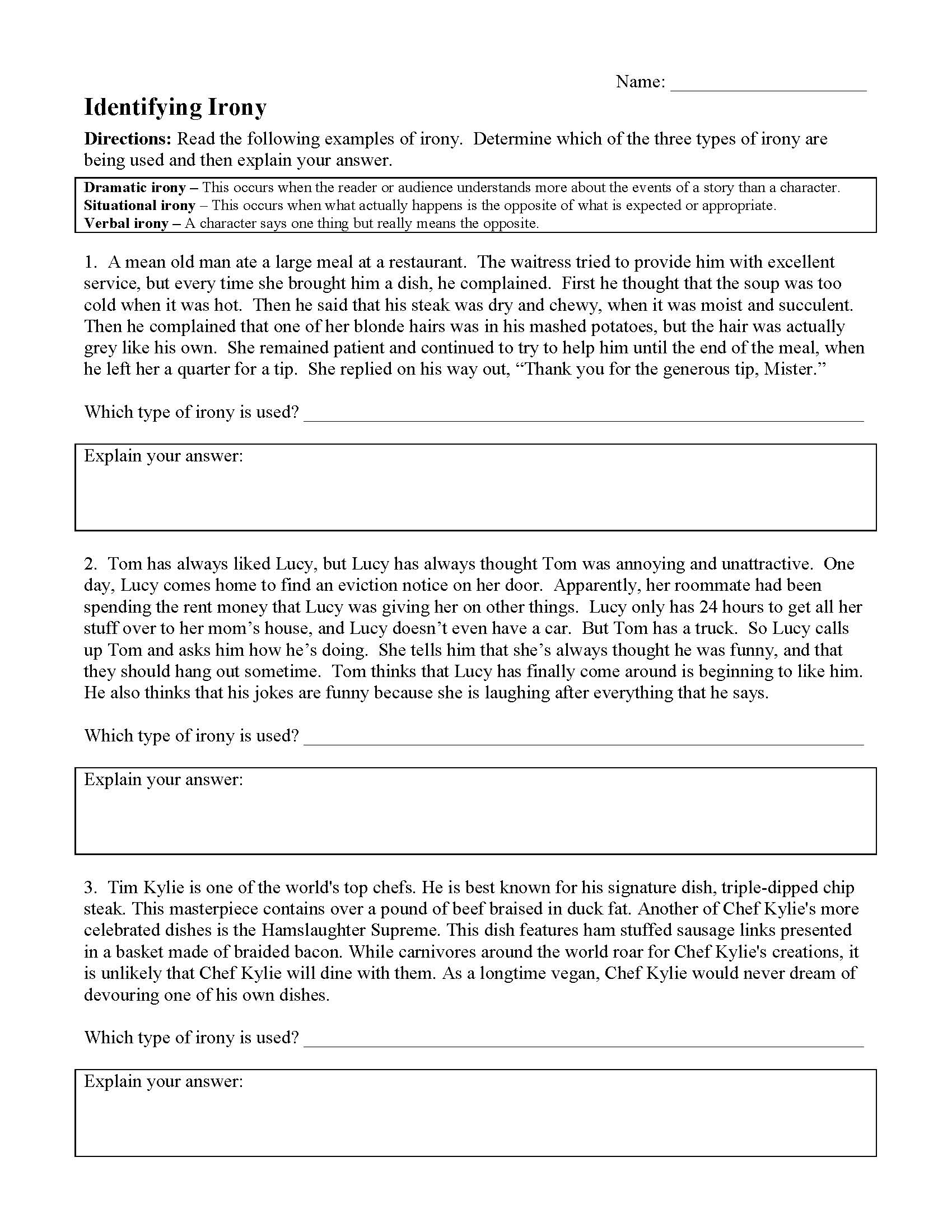Popular Content
Want Email Updates?
Get emails about new stuff.
Be the first to know.
Looking for Something?
Irony Worksheet 1
Here is a great worksheet to help students practice or review irony. They will read examples of irony and determine which of the three types of irony is used (verbal, situational, or dramatic). Then they will explain their answers. Suggested reading level for this text: Grade 5-9.
Readability Score for Irony Worksheet 1
Click to VIEW ALL Readability Scores for This Text
SMOG Index
9.1
Average Grade Level
6.7
Based on the readability scores for this text, Irony Worksheet 1 is recommended for students reading at grade levels 5 - 9. This text should be accessible to any student reading at a 5th grade reading level or higher.
5th Grade
← ★ →
9th Grade
Complex
Simple
Irony
Common Core State Standards
Irony Anchor Standards
R.6 - Assess how point of view or purpose shapes the content and style of a text.RL.8.6 - Analyze how differences in the points of view of the characters and the audience or reader (e.g., created through the use of dramatic irony) create such effects as suspense or humor.
RL.11-12.6 - Analyze a case in which grasping a point of view requires distinguishing what is directly stated in a text from what is really meant (e.g., satire, sarcasm, irony, or understatement).
Click to VIEW Grade Level Standards for R.6
L.5 - Demonstrate understanding of figurative language, word relationships, and nuances in word meanings.
L.6.5 - Demonstrate understanding of figurative language, word relationships, and nuances in word meanings.
L.7.5 - Demonstrate understanding of figurative language, word relationships, and nuances in word meanings.
L.8.5a - Interpret figures of speech (e.g. verbal irony, puns) in context.
L.9-10.5a - Interpret figures of speech in context and analyze their role in the text.
L.11-12.5a - Interpret figures of speech in context and analyze their role in the text.
L.6.5 - Demonstrate understanding of figurative language, word relationships, and nuances in word meanings.
L.7.5 - Demonstrate understanding of figurative language, word relationships, and nuances in word meanings.
L.8.5a - Interpret figures of speech (e.g. verbal irony, puns) in context.
L.9-10.5a - Interpret figures of speech in context and analyze their role in the text.
L.11-12.5a - Interpret figures of speech in context and analyze their role in the text.
Click to VIEW Grade Level Standards for L.5
Looking for More Irony Worksheets?
Here are all of our Irony Worksheets
Looking for Something Else?
Search This Site
Subscribe Now
Get emails about new stuff.
Don't worry. I hate spam too.
Some Other Useful Pages
- Author's Purpose Worksheets
- Characterization Worksheets
- Conflict Worksheets
- Fact and Opinion Worksheets
- Figurative Language Activities
- Figurative Language Poems with Questions
- Genre Activities
- Irony Worksheets
- Making Predictions
- Mood Worksheets
- Nonfiction Passages and Functional Texts
- Parts of Speech Worksheets
- Poetic Devices
- Point of View Worksheets
- School Project Ideas
- Setting Worksheets
- Simile and Metaphor Worksheets
- Story Structure Worksheets
- Text Structure Worksheets
- Theme Worksheets
- Tone Worksheets
- ALL PAGES AND WORKSHEETS
Search This Site







